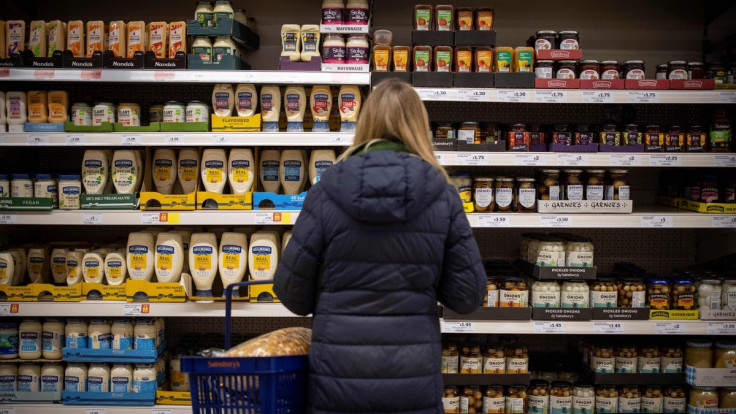Inflation takes food prices nearly 9% higher than this time last year
Just when it looked like we reached a turning point in the fight against inflation, figures from last-month show its impacts are still biting retailers. Inflation has taken food prices 8.9% higher than this time last year.

Just when it looked like we may have reached a turning point in the fight against inflation, newly released figures show its impacts are still hitting retailers right where it hurts.
Data from the Office of National Statistics (ONS) revealed a 0.9 per cent drop in shop sales through March, following consecutive rises in January and February.
The news comes after UK inflation slowed slightly last month but held stubbornly above 10 per cent.
Food sales were also down as rampant inflation continues to keep consumers away from the shops.
According to data collected by the British Retail Consortium (BRC), average shop prices are now 8.9 per cent higher than they were at this time a year ago. It is the highest rate ever recorded and represents a significant acceleration from the 8.4 per cent measured in February.
The surprise inflation spike caused the Bank of England to raise interest rates for the 11th time in a row last month.
The British Conservative government, headed by Prime Minister Rishi Sunak, had last month unveiled a budget aimed at tackling a cost-of-living crisis - which has sparked strikes as many wages fail to keep pace.
But despite these anti-inflationary policies, the British economy remains in a whirlwind of soaring inflation that has remained at a 40-year high, with the latest GDP reading showing the economy has started to contract.
Though, it is not only inflation which is stunting sales in the UK.
The gloomy retail outlook can, in part, be attributed to the gloomy weather seen throughout March and much of April.
Darren Morgan, ONS Director of Economic Statistics, said: "Retail fell sharply in March as poor weather impacted sales across almost all sectors."
According to the Met Office, last month was "the wettest March in over 40 years" throughout England and Wales.
Wales had 206.5mm of rain, double its long-term average. For England, 119.2mm of rain fell, which is more than double its long-term average, with 104 per cent more rainfall than average.
Finally, issues with supplies and shortages have also been hampering food sales around the country.
Shortages of essential food and drink items have been rife in the past month, caused by poor harvests in Europe and North Africa, according to Helen Dickinson, chief executive of the BRC.
This has led supermarkets to introduce limits on the number of certain items, such as tomatoes, peppers and salad, that shoppers could buy during the month.
"Prices of fruit and vegetables grown out of season in greenhouses in the UK and other northern European countries were further affected by high energy costs," added Dickinson.
Average energy bills increased by 54 per cent in April 2022 and rose a further 27 per cent in October last year.
In March, UK Chancellor Jeremy Hunt extended a subsidy on energy bills for a further three months, after the invasion of Ukraine by oil and gas producer Russia sent prices surging and fuelled rampant global inflation.
However, it is not all doom and gloom, according to Lisa Hooker, the industry leader for consumer markets at PricewaterhouseCoopers, who believes March's worrying figures are just a result of specific factors and is not indicative of a longer-term trend.
"The overall momentum of the retail sector remains positive and better than many expected at the start of 2023," she claimed.
Steve Ponting, Director at technology company Software AG, shares his optimism.
"The May bank holidays and the King's Coronation will hopefully lift spirits and bolster sales in the short term," he said.
But how can businesses streamline their operations to combat the current economic crunch?
"By examining processes to minimise impacts wherever possible," says Ponting. The business expert believes that rising costs should only be put onto the consumer "as a last resort."
Instead, firms should be "finding micro-efficiencies in sourcing, supply chain, logistics and in-store processes that can help retailers save on operating costs."

One way businesses could achieve this is by updating their digital ecosystems.
According to the Annual State of the Digital Workplace Report from SMG, only 26 per cent regard their digital workplace as "mature" with a further 45 per cent regarding it as "about mid-way".
Research shows the average annual amount of wasted time per employee can range from four to five days, but it can also be as high as thirty days or more.
Individuals who are slowed down by digital friction by thirty days or more are placed in a very disadvantageous situation, as they do not have enough time to complete their work - yet alone take advantage of additional training possibilities.
This valuable lost time could instead be used for employee training and education, for example, which would boost employee morale, satisfaction and output.
Dave Page, Co-Founder and Chief Strategy Officer at a digital ecosystem company, emphasises that it is crucial businesses get the employee digital experience right in order to provide an equal opportunity for all employees to benefit from learning and development tools, whilst establishing a competitive advantage.
Improvement in this area would have substantial benefits for retailers in the food and drink industry.
"Streamlining operations would ensure they can better plan inventory and stock ordering, as well as make the right decisions for their customers," explained Ponting.
© Copyright IBTimes 2025. All rights reserved.






















